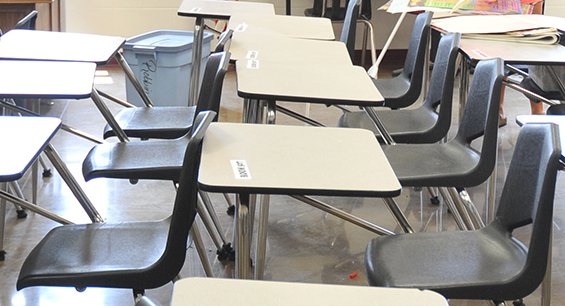Legislation that would pay for private school tuition and fees for roughly 250 students and award up to $2 million a year in state income tax credits to the contributors for the scholarships zipped through the Arkansas Senate on Thursday.
The Senate voted 25-6 to approve Senate Bill 680 by Sen. Jonathan Dismang, R-Searcy, sending the bill to the House for further action.
The action comes nearly a month after a bill that would have funded private school tuition for qualifying students and awarded up to $4 million in state income tax credits to the contributors for the scholarships failed to clear the House. The House's 44-52 vote on House Bill 1371 by Rep. Ken Bragg, R-Sheridan, fell seven votes short of the 51 required for approval in the 100-member House.
Dismang told senators on Thursday that his bill would allow parents to make decisions that are in the best interests of their children.
"I am not presenting bill to condemn public education," he said.
Dismang said he believes that the public schools are the best place for a child in most cases, but he knows that isn't always the case.
"Poor children are not the property of the schools," he said. "All kids are unique and their needs are unique."
But Sen. Joyce Elliott, D-Little Rock, said that "it's not as if I am against anybody having choice," but she worries whether "we are encroaching on the public [school] funds so much that it becomes compromised."
Sen. Linda Chesterfield, D-Little Rock, asked whether the bill "is just another voucher bill."
In response, Dismang said, "I believe this is a scholarship bill."
He said he considers the Succeed Scholarship Program to be a voucher program.
The Succeed Scholarship, managed by the Reform Alliance, is a program that for 2021 provided 665 scholarships worth about $7,000 each. The program includes foster children and those with disabilities.
SB680 would create the Philanthropic Investment in Arkansas Kids Program Act, and would apply to tax years beginning on or after Jan. 1, 2022. The state Department of Finance and Administration projects that the bill would reduce state general revenue by $2 million in fiscal 2023, starting July 1, 2022.
It would provide educational scholarship grants for eligible students to attend private schools.
Students with a household income that's up to 200% of the federal poverty level would be eligible for the scholarships under the bill. The scholarships would be for up to 80% of the state foundation funding for each student applying from kindergarten through eighth grade and for up to 90% of the state foundation funding for students in ninth grade through 12th grade.
SB680 would provide an income tax credit to individuals or businesses equal to 100% of their contributions to scholarship organizations that provide the grants, according to the finance department. The credit may not exceed an eligible taxpayer's income tax due and unused income tax credits may be carried forward for three years. The finance department's Office of Tax Credits and Special Refunds would issue tax credits on a first-come, first-served basis up to $2 million per calendar year.
In addition to establishing the standards required for the scholarship-granting organizations and tracking their grants, the state Department of Education's Division of Elementary and Secondary Education would hire an independent research organization to review information submitted by the private schools on the academic achievement of students attending those schools under the program created by the bill, the finance department said.
Since the tax credit is equal to 100% of a contribution, the finance department said it expects the $2 million cap to be reached each year. One large corporation or an individual taxpayer could potentially receive the full amount of the annual credit limit by making a $2 million contribution, the department said.
Department of Education Secretary Johnny Key on Wednesday called the bill "a reasonable and responsible approach to providing additional education choices for low-income families in Arkansas."
Because the bill would cap the tax credits at $2 million, "this bill would not create an impediment to our responsibility under the constitution to fund our public schools," he told the Senate Revenue and Taxation Committee. The bill is consistent with what the state has done for a number for years with respect to state funding of vouchers for private pre-kindergarten programs and state-funded scholarships for private colleges and universities, he said.
Republican Gov. Asa Hutchinson supports the bill, said his spokeswoman Katie Beck.
